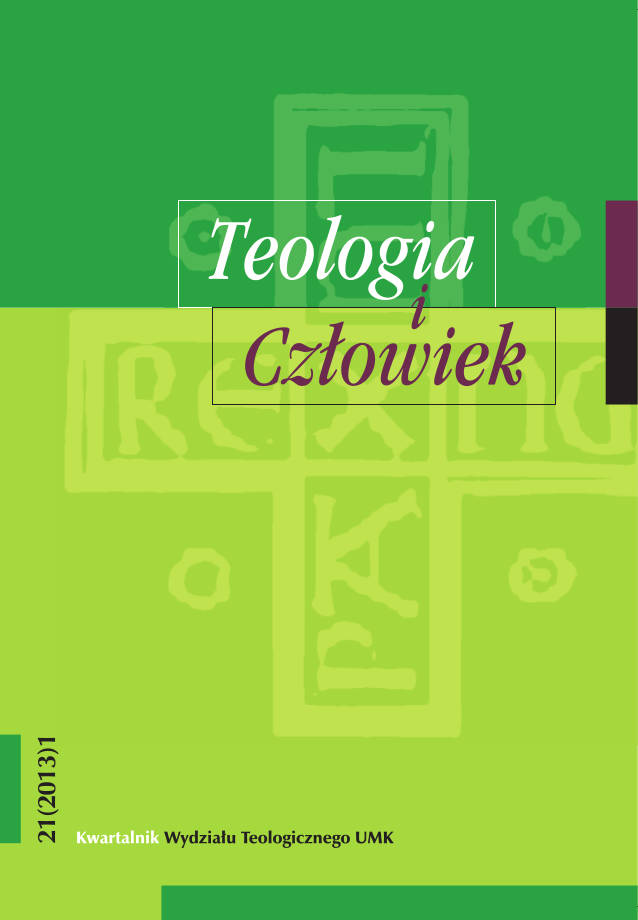Nauczanie moralne Kościoła w dialogu ze współczesną kulturą zawarte w jego nowym Katechizmie
DOI:
https://doi.org/10.12775/TiCz.2013.002Słowa kluczowe
nauczanie moralne, kultura, katechizm, dialog, DekalogAbstrakt
Zadaniem każdego katechizmu jest przedstawić wiarę w sposób jasny i komplementarny, przy zastosowaniu zrozumiałego w danym czasie i kulturze dla wszystkich języka. Treść ta musi wejść w pewien rodzaj dialogu ze współczesnym człowiekiem jak i kulturą, aby efektywnie służyć i przynosić owoce wiary i życia moralnego. Taka sama prawda dotyczy Katechizmu Kościoła Katolickiego ogłoszonego przez Jana Pawła II, który ma swoje oparcie także we współczesnej kulturze. Można je dostrzec zarówno w celach, środkach, jak i sposobach prezentacji depozytu wiary. Zamiarem redaktorów było ukazać nauczanie Magisterium w możliwie najbardziej przystępny sposób. Metodą nie jest potępianie błędów doby współczesnej, zgodnie z apologetyką, ale przedstawianie prawd wiary i moralności w najbardziej pozytywny sposób, biorąc pod uwagę specyfikę adresata, będącego pod wpływem wielu różnych prądów i tendencji, które niekoniecznie są przyjazne wierze i życiu na niej opartemu. Jest rzeczą wiadomą, że obecna sytuacja ma wpływ na sposób prezentacji problemów w Katechizmie. Kulturowe podstawy mogą zostać dostrzeżone tam, gdzie bierze się pod uwagę postęp antropologiczny, wiedzę techniczną jak i zmiany społeczne uznane za wyzwanie. Można je zauważyć, gdy nowe rzeczy są poruszane, i gdzie stare rzeczy są interpretowane w nowy sposób. Katechizm nie dedykuje żadnej ze swych części wyłącznie zagadnieniom kultury współczesnej, chociaż wyraża jej stosunek do współczesnych religii, nauki, prądów filozoficznych czy też systemów politycznych opisujących zarówno relację człowieka do Boga, jak i jego życie w społeczeństwie. Patrząc z perspektywy dwudziestu lat od dnia podpisania Katechizmu można powiedzieć, że stał się ważnym elementem dialogu kulturowego Kościoła. Z powodu szybkich zmian zachodzących w kulturze należy podkreślić znaczenie wierności duchowi Katechizmu, jednocześnie prowadzącej do nieustannych analiz i ciągłych adaptacji, nie w kontekście treści, ale w sposobie prezentacji wiary i zagadnień moralnych.
Pobrania
Opublikowane
Jak cytować
Numer
Dział
Licencja
CC BY ND 4.0. Posiadaczem prawa autorskiego (Licencjodawcą) jest Autor, który na mocy umowy licencyjnej udziela nieodpłatnie prawa do eksploatacji dzieła na polach wskazanych w umowie.
- Licencjodawca udziela Licencjobiorcy licencji niewyłącznej na korzystanie z Utworu/przedmiotu prawa pokrewnego w następujących polach eksploatacji: a) utrwalanie Utworu/przedmiotu prawa pokrewnego; b) reprodukowanie (zwielokrotnienie) Utworu/przedmiotu prawa pokrewnego drukiem i techniką cyfrową (e-book, audiobook); c) wprowadzania do obrotu egzemplarzy zwielokrotnionego Utworu/przedmiotu prawa pokrewnego; d) wprowadzenie Utworu/przedmiotu prawa pokrewnego do pamięci komputera; e) rozpowszechnianie utworu w wersji elektronicznej w formule open access na licencji Creative Commons (CC BY-ND 3.0) poprzez platformę cyfrową Wydawnictwa Naukowego UMK oraz repozytorium UMK.
- Korzystanie przez Licencjobiorcę z utrwalonego Utworu ww. polach nie jest ograniczone czasowo ilościowo i terytorialnie.
- Licencjodawca udziela Licencjobiorcy licencji do Utworu/przedmiotu prawa pokrewnego nieodpłatnie na czas nieokreślony
PEŁEN TEKST UMOWY LICENCYJNEJ >>
Statystyki
Liczba wyświetleń i pobrań: 872
Liczba cytowań: 0



